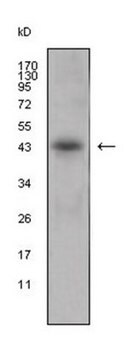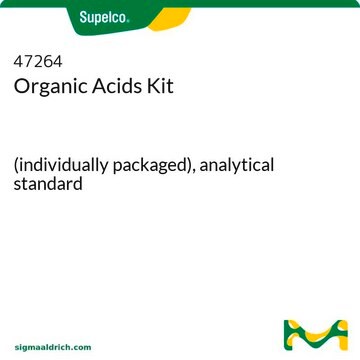PHR1468
Quinic Acid
Pharmaceutical Secondary Standard; Certified Reference Material
Synonyme(s) :
D-(−)-Quinic acid
About This Item
Produits recommandés
Qualité
certified reference material
pharmaceutical secondary standard
Niveau de qualité
Agence
traceable to USP 1594506
Famille d'API
quinic acid
CofA (certificat d'analyse)
current certificate can be downloaded
Conditionnement
pkg of 1 g
Technique(s)
HPLC: suitable
gas chromatography (GC): suitable
Application(s)
pharmaceutical (small molecule)
Format
neat
Température de stockage
2-30°C
Chaîne SMILES
O[C@@H]1C[C@@](O)(C[C@@H](O)[C@H]1O)C(O)=O
InChI
1S/C7H12O6/c8-3-1-7(13,6(11)12)2-4(9)5(3)10/h3-5,8-10,13H,1-2H2,(H,11,12)/t3-,4-,5-,7+/m1/s1
Clé InChI
AAWZDTNXLSGCEK-WYWMIBKRSA-N
Vous recherchez des produits similaires ? Visite Guide de comparaison des produits
Description générale
Application
Remarque sur l'analyse
Autres remarques
Note de bas de page
Produits recommandés
Produit(s) apparenté(s)
Mention d'avertissement
Warning
Mentions de danger
Conseils de prudence
Classification des risques
Eye Irrit. 2
Code de la classe de stockage
11 - Combustible Solids
Classe de danger pour l'eau (WGK)
WGK 1
Point d'éclair (°F)
Not applicable
Point d'éclair (°C)
Not applicable
Faites votre choix parmi les versions les plus récentes :
Certificats d'analyse (COA)
Désolés, nous n'avons pas de COA pour ce produit disponible en ligne pour le moment.
Si vous avez besoin d'assistance, veuillez contacter Service Clients
Déjà en possession de ce produit ?
Retrouvez la documentation relative aux produits que vous avez récemment achetés dans la Bibliothèque de documents.
Les clients ont également consulté
Notre équipe de scientifiques dispose d'une expérience dans tous les secteurs de la recherche, notamment en sciences de la vie, science des matériaux, synthèse chimique, chromatographie, analyse et dans de nombreux autres domaines..
Contacter notre Service technique














